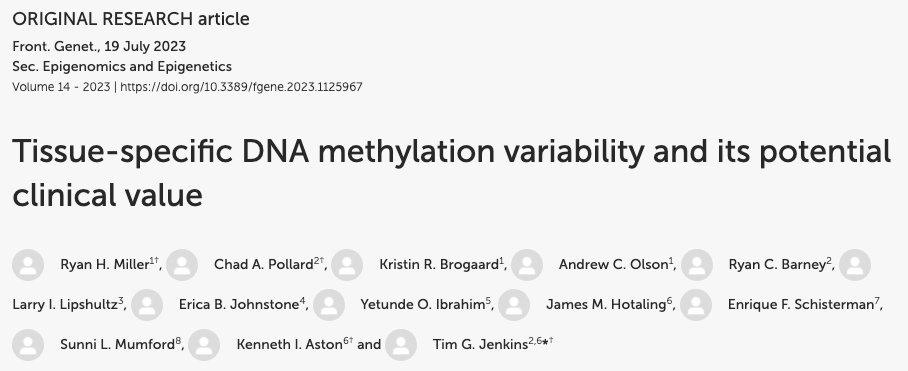A Leap Forward in Understanding Male Infertility: Inherent Biosciences' New Publication in Frontiers in Genetics
Salt Lake City, Utah — We are thrilled to announce that our latest research paper, "Tissue-specific DNA methylation variability and its potential clinical value," has been published in the esteemed journal, Frontiers in Genetics. This publication is a testament to our commitment to advancing the understanding of complex diseases through innovative research.
Our research team, led by a group of dedicated scientists, has been focusing on the intricate world of epigenetics. Epigenetics is the study of changes in organisms caused by modification of gene expression rather than alteration of the genetic code itself. In simpler terms, while your DNA is like the hardware of a computer, epigenetics is like the software, instructing the DNA what to do.
Our research focused on a specific type of epigenetic change called DNA methylation. This is a process that can turn genes on or off, influencing how they function. We wanted to understand how these methylation patterns vary in different tissues (like heart, brain, or sperm cells) and how they change in diseases.
We analyzed data from over 2,400 tissue samples and asked three main questions:
1. Are methylation patterns specific to certain tissues?
2. Do diseased tissues show different epigenetic variability compared to healthy ones?
3. Can these methylation changes be detected in complex diseases?
Our findings were quite revealing. We discovered that epigenetic variability is indeed specific to tissues, and the most stable genes in a tissue are linked to that tissue's function. Moreover, we found that our measure of epigenetic variability can distinguish between diseased and normal tissues in various complex diseases.
One of the most interesting findings was related to male infertility. We found that the variability in methylation patterns in sperm is related to the success of a fertility procedure called intrauterine insemination (IUI). Men with less variability were almost twice as likely to conceive a child through IUI compared to those with more variability. Interestingly, this difference wasn't observed in men undergoing in vitro fertilization (IVF), another fertility procedure.
The social implications of this research are profound, particularly for couples experiencing infertility. Infertility is a deeply personal and often distressing experience for many couples. Our research brings a new perspective to this issue, emphasizing the importance of understanding male infertility. By studying the variability in DNA methylation patterns in sperm, we've gained valuable insights into the role of male fertility in successful conception. This knowledge can help clinicians better predict the success of IUI procedures, providing couples with more accurate information as they navigate their fertility journey.
Moreover, our research underscores the importance of considering both partners in fertility treatments. It highlights the need for comprehensive fertility assessments that include a focus on male fertility, which has often been overlooked in the past.
Our research brings clarity and hope to couples experiencing infertility. It provides a deeper understanding of the complexities of conception and the role that both partners play in this process. By shedding light on the intricacies of male fertility, we hope to alleviate some of the uncertainty and stress that couples often experience.
We extend our heartfelt congratulations to our fantastic authors: Ryan Miller, Chad Pollard, Kristin Brogaard, Andy Olson, Ryan C. Barney, Larry Lipshultz, Erica B. Johnstone, Yetunde O. Ibrahim, James M. Hotaling, Enrique Schisterman, Sunni Mumford, Kenneth Aston, and Tim Jenkins. Their dedication and hard work have made this achievement possible.
Stay tuned for more exciting updates from Inherent Biosciences as we continue to push the boundaries of genetic and epigenetic research!
For a more detailed look at our research, you can read the full paper here
About Inherent Biosciences
Inherent Biosciences, Inc. is a biotechnology company pioneering epigenetic medicine for complex diseases. Gene dysregulation, a hallmark of complex disease, has been difficult to detect and treat, until now. The company’s epigenetic platform detects dysregulation across multiple genes and related pathways to pioneer a new category of diagnostics and therapeutics that leverage epigenetics, biology’s inherent mechanism for gene regulation, to radically transform how we diagnose and treat complex diseases like infertility.
Connect with us on LinkedIn.

